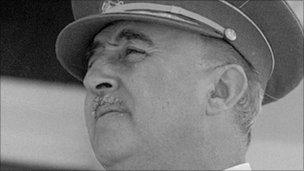Argentine court reopens Franco probe
- Published

Crimes committed under General Franco are covered by an amnesty law in Spain
An Argentine court has reopened an investigation into crimes against humanity in Spain during the rule of Gen Francisco Franco.
The appeals court overturned a previous ruling that blocked a suit brought by Argentine relatives of two Spaniards killed under Franco.
It said they had a right to know if the case was being investigated.
Crimes committed under Franco and during the 1936-39 civil war are covered by an amnesty law in Spain.
The Argentine appeals court said a diplomatic request should be sent to Spain to ask what action it was taking to investigate crimes against humanity between 1936 and 1977.
'Systematic terror'
It said Spain should be asked if it was investigating the existence of "a systematic and deliberate plan to terrorise Spaniards who supported representative government by their physical elimination."
Human rights groups have welcomed the decision.
The lawsuit was opened in Argentina in April after the high-profile Spanish judge Baltasar Garzon was forced to drop an investigation into killings during the civil war and under Franco's rule.
Judge Garzon was suspended after Spain's supreme court found that he had exceeded his authority by ignoring the 1977 amnesty law.
The Argentine lawsuit is based on the principal of universal justice.
Judge Garzon has previously invoked the same principle to investigate crimes against humanity committed during 1976-83 military rule in Argentina, as well as to seek the extradition of the late Chilean military ruler, Augusto Pinochet.
Spain's 1977 amnesty law, which pardoned political crimes by both sides in the civil war, was seen as vital to ensure a successful transition to democracy after Franco died in 1975.
Tens of thousands of people were killed and buried in unmarked graves during the Spanish civil war and under Gen Franco's subsequent rule, but no-one has ever been prosecuted for the killings.